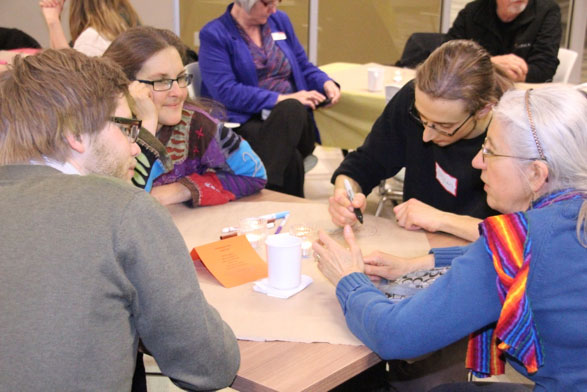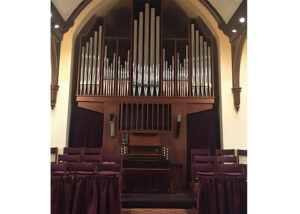Mennonite churches are afraid. In fact, Christian denominations all over Canada are afraid. We have felt this, seen it and experienced it. Sometimes this fear leads denominations to do reckless things. Sometimes it reaches the point of despair. Why so much fear?
The cause, we are told, is the youth and young adults; apparently they’re leaving. The youth group numbers are getting microscopic, and the college and careers are non-existent. Some churches are blessed to have a “vibrant” youth group or a popular young adult sub-section, but rare is the church that has both.
As a result, churches are asking many questions:
- Is the church on its last legs?
- Is secularism a rumbling locomotive that cannot be stopped?
- Are Mennonite traditions and cultures being unceremoniously discarded?
- Will there be enough money to support our churches and institutions?
- Where are the young people?
- Has God abandoned us?
- What happened?
Empathy from the past
The Israelites exiled in Babylon were asking similar questions. The northern kingdom was completely destroyed by the Assyrians, and then Jerusalem was sacked and destroyed by the Babylonians! What happened to being God’s chosen people? The Israelites had settled the Promised Land; they had maintained a kingdom and became prosperous. Surely this was only a temporary punishment by God, and God would deliver them once again and send them swiftly back to their homeland.
However, God had different ideas. In Jeremiah 29, we see the Prophet Jeremiah write from Jerusalem a very surprising letter to the exiled Israelites in Babylon. He could have written, “It’s not going to be very long; we will fight for you to return home; don’t get too invested there; it’s only temporary.” But he did not say that. He told them to “build houses and live in them; plant gardens and eat what they produce” (29:5).
What’s more, the Israelites were not just called to seek their own stability. They were called to seek the shalom of the city where God had sent them into exile, and to pray to the Lord on its behalf, for in its shalom they would find their own shalom.
While living in Babylon, the exiles had a distinct purpose. The Israelites were to meet with their neighbours, get to know them, hear their stories, share their culture, and, most importantly, help them to thrive. Values of purity and separation—which were previously the highest values for Israelite religion—took a backseat to faithfully pursuing relationship with the other.
Mission for the present
We believe that God’s message for the Israelites through Jeremiah’s letter is the same message that God has for the Mennonite church in Canada. Just as the Israelites were exiled from their comfortable homeland, so, too, is the Mennonite church called away from its comfortable era of institutional stability and pocketed cultural dominance.
This liminal space of exile called post-Christendom is not going to disappear anytime soon, so we might as well settle in here and till the soil! We need to plant gardens and share their produce, and seek the shalom of this new place we find ourselves in.
The Mennonite church in Canada will never be the same as it was. Increasingly, people no longer see Sunday morning church as mandatory for the Christian walk. We are seeing a greater cultural diversity, and the Mennonite Game is becoming exceedingly difficult to play on last name alone. As well, a different value of generosity exists that does not necessarily translate into more dollars in the offering plate.
In the past, there have been times of blessing, yes, but God continually moves us in a new direction to give us new blessings. Some of the traditions will be kept, but others will disappear.
Hope for the future
God assures the exiled Israelites through Jeremiah (29:11) that God has not abandoned them, that God surely knows the plans God has for them. These are plans for their shalom and not for harm, to give them a future with hope.
When we follow the Lord in our churches and communities, we are promised a hopeful future! This involves abandoning the idols we have made in times of comfort and influence, and boldly stepping out in faith as God leads in these uncertain times.
The comforts of our church buildings, our institutions and our unique culture are not God, but the blessings God has given us. If they have become idols, we are to toss them aside. God has blessed the Mennonite church in Canada richly in the past, and God will continue to do so in the future. However, the nature and content of that blessing will look different and we need to prepare ourselves to receive it.
Last year around this time, as young adults we were asked by Ed Janzen, chaplain at Conrad Grebel University College, Waterloo, Ont., to help him with a task he had been assigned. He needed assistance planning the Thursday evening lecture, geared toward young adults, for the annual Mennonite Church Eastern Canada School for Ministers conference that happens at Grebel every February. We accepted with reluctance and some tempered enthusiasm.
The three of us did not find it particularly energizing at first because we felt young adults were once again compartmentalized tokens. A young adult chaplain and two young adults were asked to plan yet another young adult event that not too many young adults would actually be interested in attending. Why were young adults being singled out?
Throughout our planning meetings with Janzen, we came to the determination that God was going in a different direction. Why do we have to do a lecture? Can it be something energizing? Why is it aimed only at young adults? Can we eat food?
The event was called Awakening Hope and was open to the community of all ages. We started with potlucks at multiple houses around the city, and then came together to tell stories, sing songs and create art at the new Mennonite hub at 50 Kent in Kitchener, Ont.
One friend told us that there was just enough organization and structure to make sure the event went smoothly, but also enough spontaneity to make it fun.
The event was not a smashing success. It was merely community coming together in a natural and organic way. Together, we experienced a way of doing church and worship that combined elements of tradition with creativity. It existed in that in-between void that the church is now called into.
What does this mean?
We are not asserting that everything about the Mennonite church in Canada should change. There are many things that Mennonites do well and many ways that we continue to experience God’s blessing. But we are writing that God is calling all of us to release our control and our power so we can invite the Holy Spirit to move among us.
Furthermore, it means we must jettison the pervasive fear that plagues our churches about the long-term future. It means that we must once again surrender control of our weekly attendance and finances to God. It means we must stop the passive-aggressive shaming or manipulation of young people so that they don’t leave the church.
We cannot speak for all young people, but there are some important things you need to know:
- Young people who have grown up in our faith communities are, on the whole, doing well.
- We are full of questions and seek answers with integrity.
- We seek to make a change in our world to bring the reign of God closer to reality.
- Many of us even have vibrant and eclectic Christian faith; it just may look a little different for some of us today than it has in the past.
It also does not necessarily mean that weekly church attendance is a high priority. People of our generation seek authentic worship, and if it seems that Sunday morning is all about maintaining structures and self-preservation, then not too many will buy into that. Fortunately, we personally have been blessed to worship with many congregations that are open to God moving in the church.
As far as we can tell, there will be a place for the Mennonite church in Canada for a long time to come. It continues to grow and there are many of us young people who are deeply passionate about it. We need to be faithful to where God leads us in this next chapter so that together we can receive a future with hope.
Chris Brnjas and Jessica Reesor Rempel are founders of PiE, a ministry start-up dedicated to being pastors to young people in Waterloo (Ont.) Region who exist in the liminal space between Christian and secular identities.
For discussion
1. What are your fears about the church? How much do we fear the declining involvement of young people? How much do we fear secularism? Do we fear a decline in financial support for our churches and institutions? Does it feel as though God is abandoning the church?
2. Chris Brnjas and Jessica Reesor Rempel suggest that God is calling the Mennonite church “away from its comfortable era of institutional stability and pocketed cultural dominance,” and that maybe our institutions and unique culture have become idols. Do you agree? Are these young people offering a hopeful prophetic message?
3. Brnjas and Rempel write: “Increasingly, people no longer see Sunday morning church as mandatory for the Christian walk.” Do you agree? Is this because God is calling us to a different way of doing church or is it self-indulgence?
4. Do Rempel’s potluck picnics or Brnjas’s pizza Mondays sound attractive? Is this doing church in another form? Do you find hope in the emphasis on relationships? What signs of hope do you see in the young people of your community?
‘Give us the strength and guidance we need to push forward in truth’
—Barb Draper
See also the sidebars:
The joy of pizza
Potluck picnics in the park










Leave a Reply
You must be logged in to post a comment.